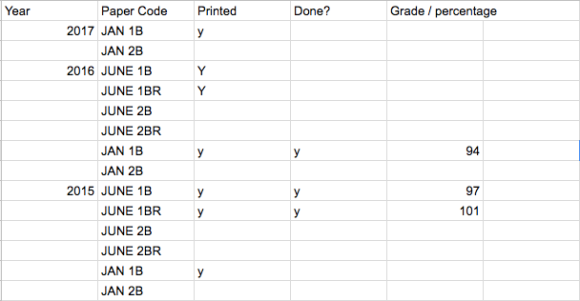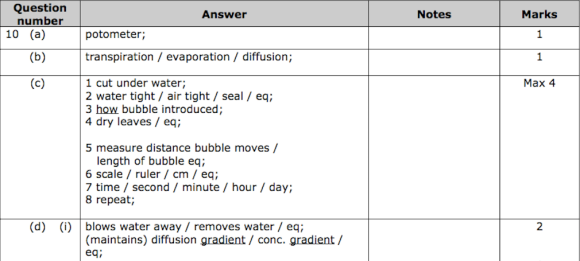So my GCSEs finished a couple weeks back, and now I’m happily binging TV shows and writing. My exams generally went alright, but I decided to make this post to share my tips and hints. These are quite general tips, so I hope they can apply for A level too! I suggest that you too, write down everything you did this year, to reflect on what you could do better next year. My italicised sentences is my future improvements.
Firstly, get on top with my lingo –
Exam series – The year the exam paper came from. Eg. for IGCSE Edexcel Biology 2016, there are 6 exam papers, 3 x Paper 1, which is Double science. 3 x Paper 2, which is Triple Science. One set (paper 1 and paper 2), was taken in January, and the other two sets where taken as regional and non regional papers, which was taken in June. Understand?
Syllabus/spec points – Everybody’s is different, according to the exam board. But you’ll notice at the top of my blog posts, sciences especially there are little numbers next to it, e.g 2.63 – describe the structure of the heart. One spec point essentially, is a bullet point that you need to know, in the syllabus which is a checklist of things you need to have revised, come exam time.
Grade boundaries – the percentage at which a grade is awarded. Eg, 80% for an A*, 70% for an A and so on. It changes every year, dependent on the difficulty of the test paper and it’s takers.
- Practise papers, past papers, and self-testing are best ways to revise. I know you get told this a lot, but it’s the only way to know you’ve truly revised and know the topic inside out. Make a list of past paper questions on a sheet like so; this was for biology.

– I would add a date at the side to see if you were improving/ if the exam that year was just more difficult. Instead of grade/percentage, put raw score. The numbers displayed there are my raw scores, not my percentage!
– Also, print the thing out and stick it on your wall so you can track it better.
I find that making a list incentivises you to actually do the past paper, also you can keep track of what you’ve done and haven’t done. I wasn’t meticulous with recording, BUT I do promise you that I did do the entire past paper vault.
- When doing essay based exams, like English or History, work backwards. Work from 2017 (or whatever year you’re reading this from) backwards to 2012, eg. 2017, 2016, 2015, 2014, 2013, 2012 exam series. Unlike sciences where you should work from 2012 to 2017 as the papers get more difficult, essay based exams tend to stay the same in terms of grade boundaries and difficulty. The only thing that changes is the content. You’ll notice that the content tends to spin on a carousel, and if you work backwards, you are more likely to get the question content on a practise paper on your actual exam. This worked for all of my English exams!
- Do your notes as you go along. I started doing this only in year 11, and I wish I had started earlier. Although in the short term you may not want to study after a tiring day of school, in the long term it really helps.
Short term pain, long term gain.
You’ll find, like I did, that I had far less to do during exam season, and could really focus on past papers. There are different ways to do ‘notes’, or more accurately collate information. Here is what I did:
- Flash cards. On paper : Key information for physics and chemistry (equations). On screen (quizlet) : Every subject’s important info that I need to remember
- Index cards. Long mark answers with exam bullet points and key English quotes for my books, Of Mice and Men, as well as An Inspector Calls. ( Like flash cards but with way more info that I need to know in detail)
- Notes. Self explanatory. I take regular class notes and then at night copy it with the syllabus statements on top, with it’s content, and then add more detail with the text book or youtube videos. Write the entire spec point out, not just the numbers – that way you make sure you learn only the bare minimum, or misinterpreting it. Keep your notes neat and legible.
- Blog. If I have time I’ll copy the information onto saturnine notes. Re writing notes is a good way to revise, but VERY ineffective.
- Mind maps. Used to collate huge amounts of info for English texts (here and here). Also for brain dumps when I panic before exams – brain dumps are when I put absolutely everything I know onto a piece of paper, and another way of testing yourself on huge amounts of knowlage.
- Summary foldable. I use these for large chunks of vocabulary or equations I need to know in sciences and languages, I put them in my bullet journal so I can always be revising.
I wish I spent less time making my notes look pretty and more time making them functional. Summary foldables and index cards are what will be my main source of notes next year.
- When doing notes according to spec points, use mark scheme answers. If you want to learn the bare minimum, this is how you do it. Edexcel Biology IGCSE A*-G, Potometer practical – note question C’s answer has 8 possible bullet points. If you could memorise 4 out of the 8, you’d get full marks for that question.

I would look up all GCSE recurring questions like these (especially for practicals) and memorise the mark scheme bullet points, and use them for my notes instead of the bulky, long explanations from text books and revision guides.
- Youtube revision videos are a great source of revision! Especially for auditory learners. Here are ALL the ones I used (And wouldn’t have passed without them). If you found them helpful, say I sent you! They aren’t all GCSE channels, some have A level content too.
- Christopher Thornton https://www.youtube.com/channel/UCUCflFdFB1ctTM0lkILbbwA
- Dani’s revision channel https://www.youtube.com/channel/UCVsoyitiHKiPsViEyD0uCxQ
- Doodle science https://www.youtube.com/channel/UCVsht7u_tasenyLOrXCMm2g
- Free science lessons https://www.youtube.com/channel/UCqbOeHaAUXw9Il7sBVG3_bw
- Fuse school ❤ https://www.youtube.com/channel/UCS3wWlfGUijnRIf745lRl2A
- I’m stuck – GCSE revision https://www.youtube.com/channel/UC14dDzM6HDofIR0vgwq4rOg
- Matthew Langrige https://www.youtube.com/channel/UCmxxf_xeh-3Dn8SBn5N-Uig
- Mr. Taylor https://www.youtube.com/channel/UCwPmyRwUpAGp7X395-eZRTw
- Mr. Bruff https://www.youtube.com/channel/UCM2vdqz-7e4HAuzhpFuRY8w
- Revision with Eve ❤ https://www.youtube.com/channel/UCD2h_l6FMIta19ronaayedg
- Science with Hazel ❤ https://www.youtube.com/channel/UCMdb23cYgONtCG-zPaWigog
Know when to trust them and when not to. Be careful as they give you the overview, but according to different exam boards you may get less or more detail than you need.
- Know your specification inside and out. That way, you know what paper has what content, and you’re not the idiot who revised the wrong content for the paper. There is a spec for every subject, and make sure you know it.
I hope this has helped you in some way, and that my babbling has made sense. I wish you the very best of luck with your GCSEs / A levels and your results! I won’t be posting anymore GCSE notes, apologies, but I might be doing A level notes in the future if I have time
– S.N x
(PS – Check out my personal blog where I will be uploading twice a week!)
